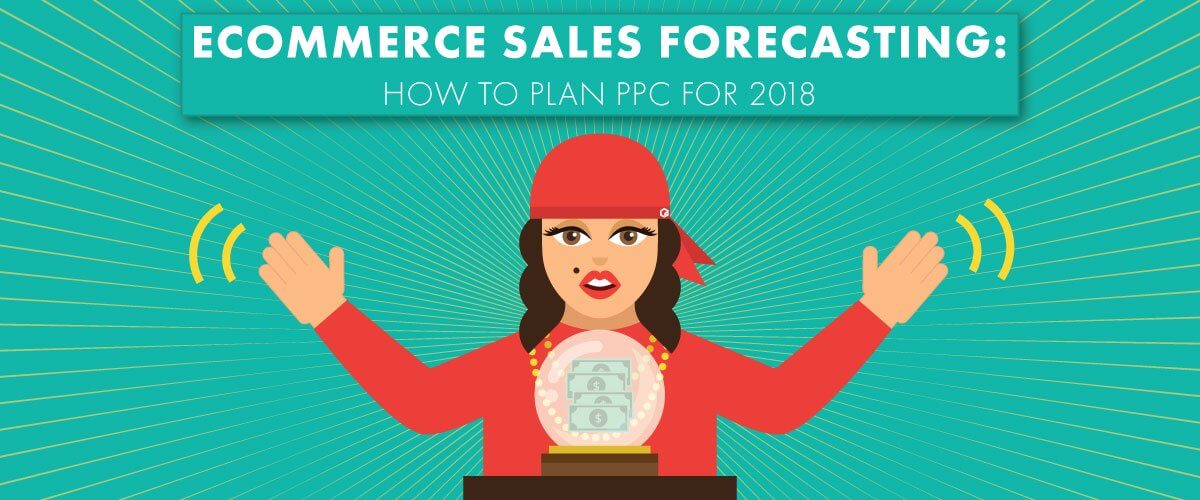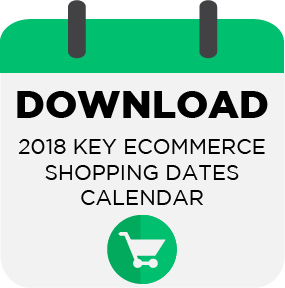Wouldn’t it be great if you could read minds? If you could, you’d definitely be invaluable to the success of your e-commerce company’s paid search campaigns. That ability may be out of reach, but luckily, PPC provides the power to forecast the future outcome of your campaign performance.
The e-commerce sales forecast has a direct influence on the success of your business. Access insight on the forecast at any time by evaluating past and present data within your PPC campaigns.
The following steps— analyzing past performance, will show you how to plan PPC for 2018 successfully.
Evaluate Past Holiday Performance
Evaluating your holiday campaign performance is a great indicator of year round campaign management. The increased volume of shoppers during the holiday season magnifies typical campaign performance. This makes for a clear read on what’s going on in your campaigns.
In Google Analytics, compare data from Nov- Dec 2016 & 2017 to identify year over year trends. 
When comparing data in Analytics, make annotations along the graph, in areas of high and low performance, to easily identify positive and negative influences on your campaigns. Make note of special promotions you ran that year or if you encountered any issues.
For example, your website goes down. Create an annotation explaining the issue, so when you look back and see that sales were down on that day, you can quickly identify the reason why. Get in the habit of using annotations to save time in future performance evaluations.

After your data analysis, you’ll have a clear understanding of what worked well for your holiday campaigns. Use your research to then construct a 2018 PPC strategy that you’re confident will endure year over year growth. This process is unique to your business, so here are a few questions to inspire your own evaluation process:
- Which tactics produced results?
- How can I use these tactics to continue producing results?
- How can I reallocate budget to support my top performing campaigns?
- Has my audience shifted from any big outside influences in the Industry? What can I do to stay relevant to them?
- How might a special promotion affect my performance?
Think of how to connect the dots from your performance data to your campaign strategy.
Finish your analysis and evaluation by creating a set of realistic goals. The most effective goals are ones based on your data-driven research. Monitor your goals and track progress to keep your 2018 PPC campaigns on the road to success.
Identify Important Retail Dates
The e-commerce industry is driven by shoppers and their buying patterns; therefore, constructing a successful roadmap for your paid search campaigns requires attention to overall consumer behavior. It’s your job, as an advertiser, to be on top of important dates within the retail industry that may impact your performance. Knowing important dates ahead of time will give you ample time to plan your campaigns in advanced. More time equals more creativity, more opportunities, and less mistakes.
Reflect on your research and make note of specifics dates (days, weeks, months, even time of day), that coincide with your observations. Refer to your annotations in Analytics to pinpoint dates and date ranges of high value performance. Chances are, areas of enhanced performance are influenced by outside factors that affect the retail climate.
What special dates can you prepare your campaigns for and capitalize on?
Plan Holiday Promotions
Many companies make a large part of their yearly income from holiday sales. Although the holiday season feels far away, most established businesses will complete e-commerce sales forecasting and solidify plans for holiday PPC promotions, no later than July 31st. The stakes are high during the holidays and in order to keep up with top competitors, you should stick to the same deadline.
Locking in your holiday promotions early also lessens the chance of making critical errors. Poor holiday planning often results in data feed errors, items out of stock, not enough budget, or missed promotional opportunities.
This past season, 60% of holiday shoppers said the majority of their purchases were primarily influenced by promotions. You’ve done the research— now capitalize on the low-hanging fruit. Isolate top-performing products or services and give back to your customers by offering them something special. It could be as big as 50% off or as small as free shipping. Odds are, you’ll find a shopper who’s flattered either way. That offer could be the difference between a bounce and a sale.
Click here for a step-by-step guide on how to maximize your holiday shopping campaigns.
Going into the 2018 holiday season with a plan of action is the best way to succeed. Preparing your promotions ahead of time will allow you to make swift adjustments amidst the holiday chaos. You can focus your time on growing your campaign performance rather than stressing out, trying to fix mistakes to save your year.
Stay on Top of Industry Changes:
During the 2017 holiday season, Google made nine updates to the AdWords platform. Who’s to say they won’t make more this season? Change within any paid search platform is inevitable, so to get the highest return from your Paid Search campaigns is to stay on top of industry changes.
Your campaigns will best serve you if they’re utilized to the best of their ability. Check Paid Search and digital marketing news resources regularly to keep your campaigns aligned with up-to-date best practices.
Here are a few great resources to follow:
Although there is a long year ahead, it’s never too early to get a leg up on the competition. You have all the resources needed to continue growing your business year over year, so go on and make 2018 your best year yet!




